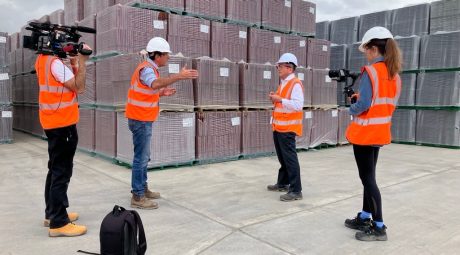Published 27/10/2025


Published 27/10/2025
If you recently watched BBC Panorama, you may have seen wienerberger featured as part of a broader exploration into the challenges facing UK housebuilding on the road to reaching Labour’s target of 1.5 million new homes by 2029.
During the programme, Justin Rowlatt visited our Ewhurst brickworks and Smeed Dean concrete roof tile plant, accompanied by our Chief Operating Officer, Keith Barker, and Chief Development Officer, Simon Nevitt. Justin’s visit focused on understanding whether ambitions in the sector could turn into reality—beginning with the supply of essential building materials.
The discussion highlighted the rising costs of building products, driven by increased production expenses. It was made clear that, should demand surge, the UK’s manufacturing sector—supported by high-quality European imports—has the capacity to respond effectively.
However, building for the future involves more than simply meeting immediate demand. It requires strategic investment in UK production capacity, sustainability initiatives, and the long-term resilience of our industry. Achieving the ambitious target of 1.5 million new homes will depend on ensuring we have the necessary capacity, quality, and skilled workforce to produce the required building materials over the coming years.

Chief Operating Officer, Keith Barker, filming with BBC's Panorama at Smeed Dean
At wienerberger, we have long since championed the need for transformative change to kickstart growth and stimulate development in the housebuilding sector. The BBC Panorama documentary highlighted one of the most pressing issues facing our industry: the challenges posed by the current planning system, which is significantly hindering progress.
Whether due to inefficiencies or the complexities of existing processes, planning delays have a tangible impact on construction, affecting the pace of housebuilding, limiting job opportunities, and potentially holding back growth. This highlights the need for positive changes to create a more streamlined and effective process.
The Planning and Infrastructure Bill is a key part of Labour’s plan to get Britain building again and “unshackle” our construction sector, to use the government’s own language.
The Bill, which went before the House of Lords in October in its progression through Parliament, proposes significant changes to help make it easier for developers to build houses and infrastructure projects in England. It aims to remove red tape and tackle blockers with new powers to stop councils refusing planning permission while they consider using ‘call-in’ powers.
When it was first introduced to Parliament in March 2025, it set out a number of steps such as improving certainty and decision-making in the planning system, and delivering a more efficient and predictable system for energy infrastructure projects. Other aims include unlocking land for large-scale investment by changing the compulsory purchase order (CPO) process, streamlining the delivery of transport infrastructure projects, and introducing a more strategic approach to nature recovery in relation to development.
Amendments have been made over the months that followed - as you would expect with a significant proposal of this kind - but with the Bill now well on its way through Parliament, we support the changes and hope that positive progress is on the horizon.
wienerberger's Smeed Dean concrete roof tile plant
These changes are not only essential for the construction industry, but also for the people and communities waiting for the benefits they bring. Every delayed planning application means delayed homes, delayed infrastructure and delayed investment in local economies. The ripple effects are wide reaching – from small suppliers waiting on orders, to families struggling to find affordable homes. Reforming the planning system isn’t just a matter of process, it’s about unlocking opportunity and improving people’s lives.
Of course, progress rarely comes without challenges and it is important that local authorities are supported through changes. Many councils remain under-resourced and overburdened, which contributes to the slow pace of decision-making. It is vital therefore, that any successful overhaul of the planning system includes support for local planning departments.
However, let’s not be mistaken - this is a huge opportunity if we can get it right. By aligning housing delivery with energy, water and transport infrastructure, the government is taking steps towards supporting the creation of communities that are more resilient, sustainable and better connected. This kind of joined-up thinking will help ensure that new developments are not just quicker to approve, but better places to live and work in.
In summary, the Planning and Infrastructure Bill has the potential to be the catalyst the housebuilding sector has been waiting for. With the industry’s support, it could remove longstanding barriers to growth, support the delivery of high-quality homes and provide the infrastructure backbone that we need for a thriving, modern economy. In our role as a trusted provider of building materials and support services, we look forward to collaborating with our customers and industry partners to help make those goals achievable.
Watch BBC Panorama – The Race to Build 1.5 Million Homes